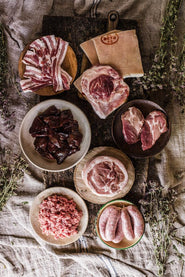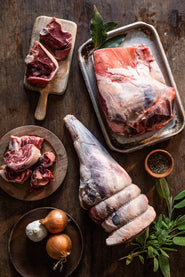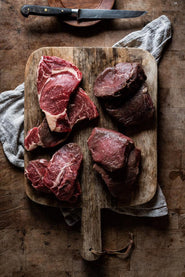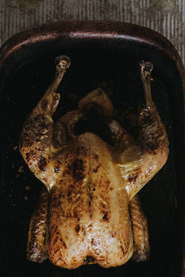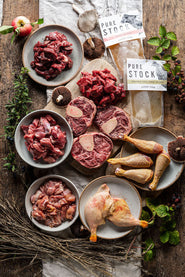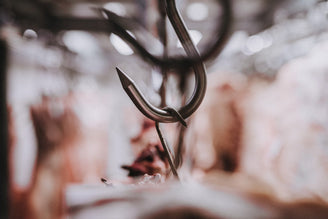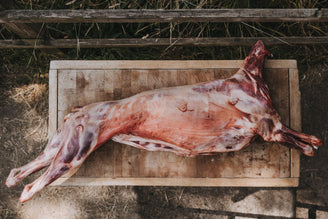A report published by The Sustainable Food Trust has outlined that the UK’s network of local abattoirs is at near collapse.
Just a few short weeks ago we took part in the annual Sustainable Food Trust conference at Fir Farm. On the agenda was an array of thought-provoking talks, including a subject that has been part of our manifesto for the last 25 years, the importance of small-scale local slaughterhouses.
Over the last decade, more than a third of small abattoirs have closed. In England, there are just 63 small abattoirs left.
The reasons for the continuing closures include the disproportionately high burden of regulation imposed on small abattoirs, falling cattle numbers nationally and the currently very low and often negative profitability of the sector due to the increasing dominance of supermarkets.
At a time when demand for sustainable, traceable, local food is on the rise, and issues of welfare and health are at the forefront of many consumers’ minds, the loss of more than a third of small abattoirs over the last decade alone is jeopardising the future of local food systems with integrity.
Peter Stevenson, chief policy advisor, Compassion in World Farming said, “For several decades we have witnessed the gradual erosion of the UK’s network of small local abattoirs. Farmers who want to minimise traveling times have been unable to prevent their animals being taken on longer journeys to distant slaughterhouses as local facilities disappear. This is clearly not in the best interest of the animals’ welfare. The government must act to help reinstate local abattoirs.”
The industrialisation of livestock slaughter has arguably created a rift between nature and farming systems by further removing a farmer from such a key moment in their role of producing food.
Our Fight for Small AbattoirsFighting for small abattoirs is nothing new to us at Pipers Farm. In the early 1990’s, just when we were starting out on our journey as Pipers Farm, a huge shift happened in the meat industry, our food safety and hygiene laws were taken away from British governance and we adopted European directives. At the very same time as this huge change in governance, BSE broke out and caused one of the largest food catastrophes we have seen. With Whitehall panicked that all export trade had collapsed, hysteria spread and the interpretation of European directives were implemented so strenuously it put immense pressure on small-scale abattoirs, who not only struggled to keep up with the new guidance but could not tolerate the financial burden the new European law placed on the processing of meat.
We could not sit back and watch the local food chain crumble under the pressure of red pen, so we re-drafted a version of the new European directive where we encouraged ministers to release some of the pressure put on small abattoirs based on the level of risk in smaller systems versus larger processing plants.
On March 23rd 1999 we took part in a three-hour meeting where we fought our case to reduce the fees and the pressure on those operating on a smaller scale. The next day Minister Nick Brown stood up in the house of commons and presented our redrafting. The Commons agreed to wait 12 months to fully asses the impact the new guidance would have on small abattoirs before committing to the new law. However, it was too late for many abattoirs who simply could not cope.
Within 12 months foot and mouth had broken out, the lack of local abattoirs only exasperated the problem with farmers unable to move livestock a short distance to slaughter. We had lost the fight to retain a sense of rationalization and red tape swooped in and destroyed a network of skilled small-scale slaughter.
Why the Loss of Small Abattoirs is a ProblemThe decline of small abattoirs is an indicator of a more general shift being seen across rural Britain. Small-scale, traditional livelihoods are rapidly being lost in the face of a globalised food geared towards cutting costs and maximising profit.
To provide truly artisanal, sustainable and ethical food we cannot have an industrial link in any part of the food chain. Low throughput abattoirs, although called the same, provide a totally different service to large-scale, highly geared abattoirs.
WelfareWelfare should be of utmost importance at this crucial stage – when an animal’s life is about to end. Yet, animals that may never have left their farm are traveling up to 80 miles or more to be slaughtered. As journeys to slaughter get longer, animals experience the stress and discomfort of traveling long distances and often the largest cause of stress is an extensive wait at the abattoir.
TraceabilityA sustainable local food chain should be built around relationships, trust, and respect for the work carried out by the slaughterman for the farmer. Trust and respect are at the backbone of the service an abattoir provides, their reputation locally depends on it. Ensuring such a crucial part of the process of rearing meat is carried out professionally and that as a farmer you absolutely know you are receiving your own carcasses back is of paramount importance. Working with a local abattoir provides an old-fashioned service, it should not be a not a faceless process hidden behind closed doors.
Sustainable CommunityHighly geared slaughterhouses have only one focus; speed. The quicker they process the more money they make. They have no interest in small numbers, which means if we lose access to small-scale local slaughterhouse there will be nowhere for smallholders to take their livestock to kill. This would see a dramatic shift to our countryside and the communities who live within it. In one fell swoop, we would wipe out the local food chain.
Traditional Slaughter MethodsUtilising a skilled local abattoir means that we can close the loop in true artisan meat. It means we can hang our carcasses, as they are not washed. Large-scale slaughterhouses use huge amounts of water in the process resulting in poorer quality wet meat that is unsuitable to be hung.
The skill of the slaughterman or slaughterwoman also reduces the stress in the animal which results in meat that is relaxed when it is killed, this ultimately affects the tenderness and texture of the finished product.
Large abattoirs and meat processing plants tend not to cater for rarer breeds or niche cuts of meat. It is also not always possible to get the offal back from large abattoirs which mean not only are we wasting a key source of nutrition but we could be losing food that has been a staple on the table for hundreds of years.
As farmers, we are part of nature, a complex system that requires an unwavering respect for all natural life. Death too is part of nature, and by disconnecting ourselves from this only opens the door to abuse. If we do not properly scrutinise every part of the rearing and processing of meat we are opening ourselves up to increasing domination of factory and globalised food production.

